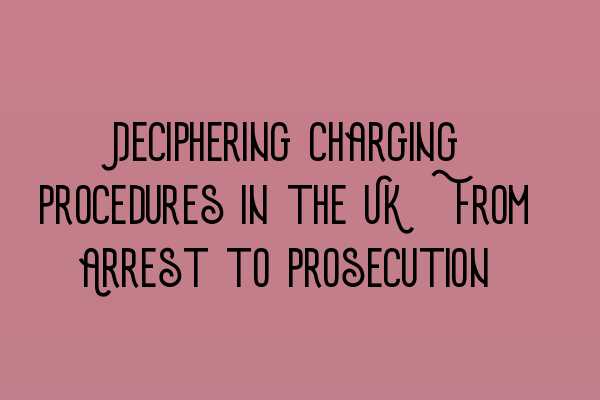Deciphering Charging Procedures in the UK: From Arrest to Prosecution
When someone is arrested in the UK, it marks the beginning of a complex legal process known as the charging procedure. Understanding this procedure is essential for individuals who find themselves facing criminal charges and for legal professionals navigating the intricacies of the UK criminal justice system.
In this article, we will walk you through the various stages of the charging procedure, providing valuable insights and shedding light on the key steps involved in the process.
Arrest
The first stage of the charging procedure is the arrest. When a person is suspected of committing a crime, the police have the power to detain and question them. The arrest could occur at the scene of the alleged crime, or it may happen later based on evidence or information gathered during an investigation.
Following the arrest, the detained individual may be held in police custody for up to 24 hours, which can be extended to 36 or 96 hours under certain circumstances. During this time, the police will gather evidence, interview the suspect, and decide whether to release them without charge, caution them, or proceed with further action.
Bail or Release without Charge
After being questioned, if the police do not have sufficient evidence to proceed with a charge, the arrested person may be released without charge. This means they are free to go, and no further action will be taken against them.
Alternatively, if the police require more time to gather evidence, they may release the individual on bail. Bail conditions may be imposed, such as reporting regularly to the police station or refraining from contacting specific individuals. The individual will then be informed of the date they are required to return to the police station.
Charge
If the police believe they have enough evidence to proceed, they will formally charge the arrested person with a specific offense. This typically occurs during a custody interview, where the charges are explained, and the individual is given the opportunity to respond.
Once charged, the arrested person is typically issued with a Charge Sheet, outlining the offense(s) they are being accused of. It is essential to review this document carefully, as it provides important details regarding the charges and the court hearing date.
If the arrestee admits to the charges, they may be placed on a fast-track process known as the Simple Procedure. However, if they plead not guilty, the case will proceed to court, and a trial will be scheduled.
Court Proceedings
When the case reaches court, the prosecution and defense will present their arguments and evidence. The trial will be presided over by a judge, and in some cases, a jury. The court will assess the evidence and make a determination of guilt or innocence.
If the individual is found guilty, the court will proceed with sentencing. The severity of the sentence will depend on the nature and severity of the offense, as well as other factors considered by the judge.
If the individual is found not guilty, they will be acquitted, and the case will be closed.
Conclusion
The charging procedure in the UK is a complex process involving several stages, from the initial arrest to the final court proceedings. Understanding the steps involved can help individuals navigate the legal system and ensure their rights are protected.
At SQE Criminal Law & Practice UK, we provide comprehensive SQE 1 and SQE 2 preparation courses to help aspiring legal professionals succeed in their careers. If you are interested in challenging yourself with SQE 1 Practice Exam Questions or want to explore SQE 2 Preparation Courses, be sure to check out our related articles.
For more information on the SQE exams and their respective dates, please visit SRA SQE Exam Dates page.
Stay informed, stay prepared, and remember, everyone has the right to a fair legal process.
Related Articles:
- SQE 1 Practice Exam Questions
- SQE 1 Practice Mocks FLK1 FLK2
- SQE 2 Preparation Courses
- SQE 1 Preparation Courses
- SRA SQE Exam Dates
